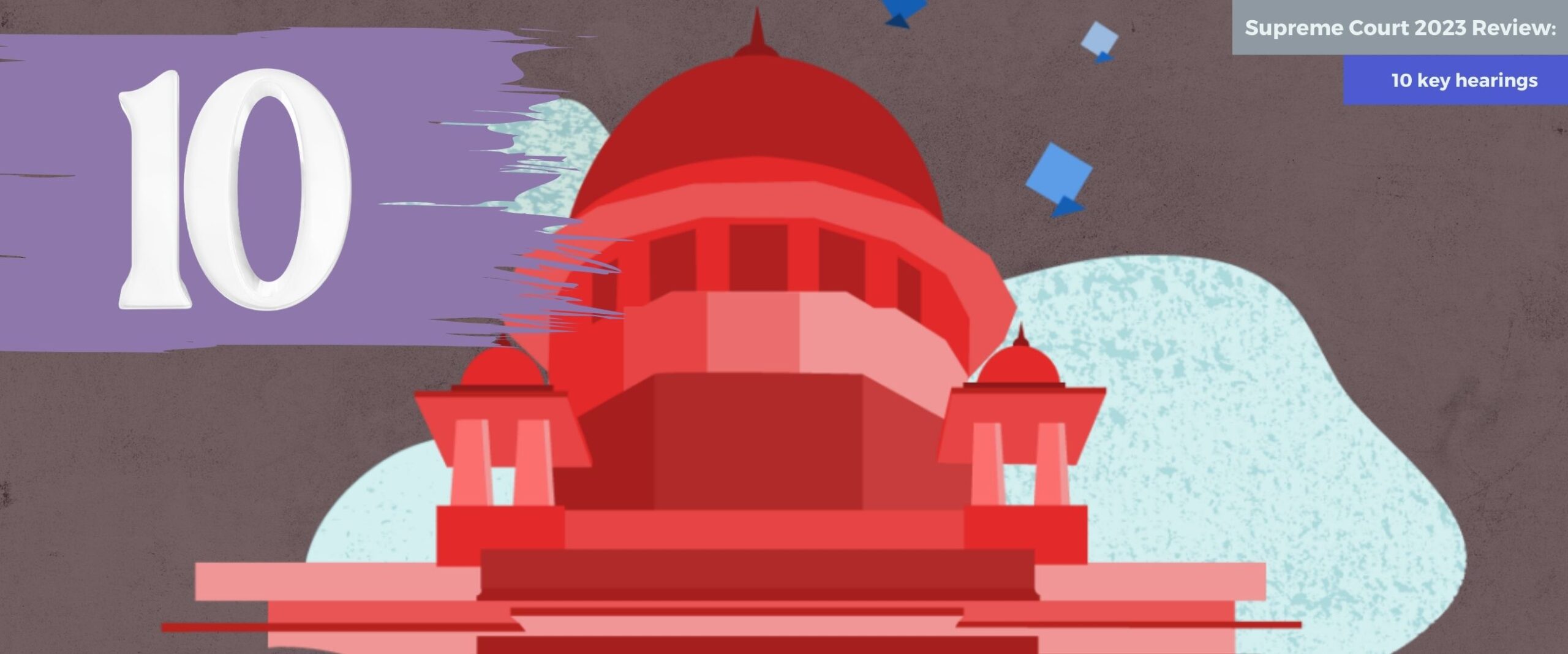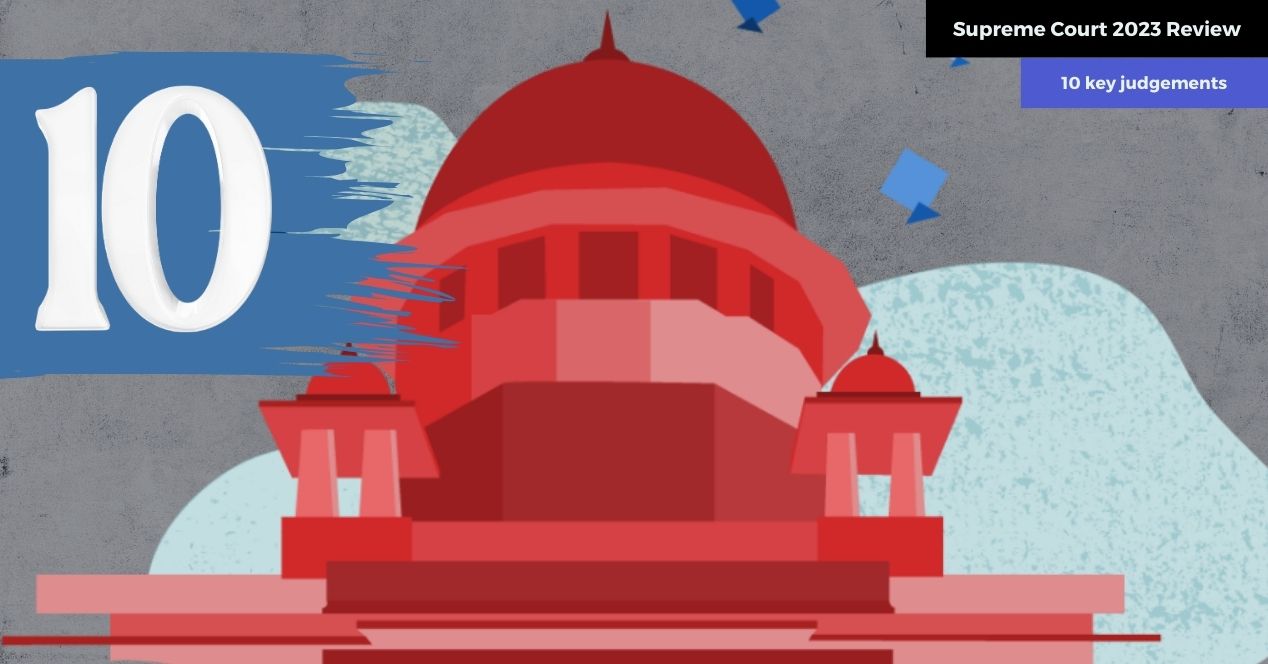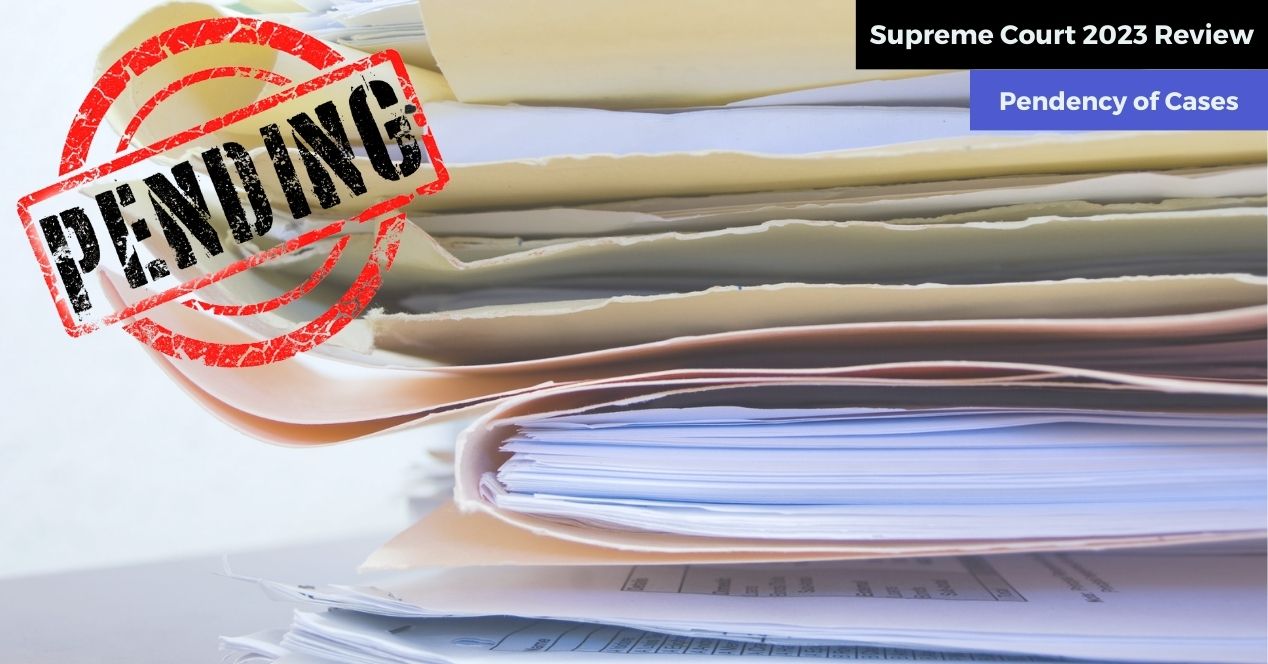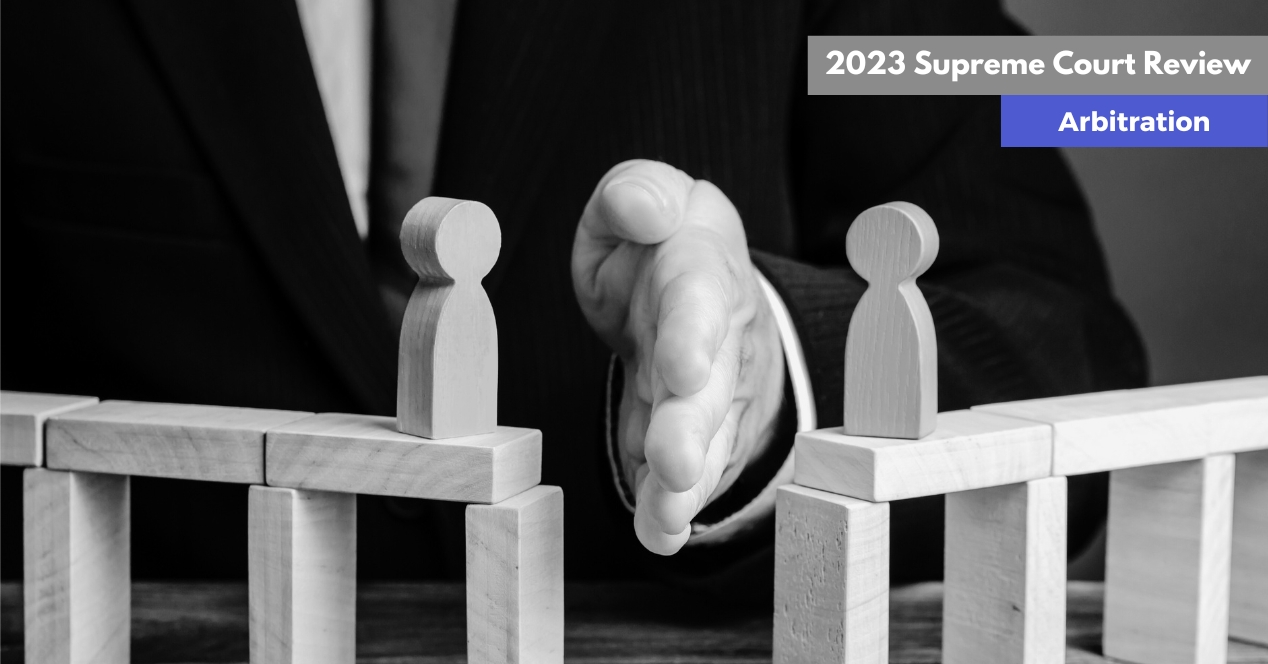Analysis
2023 Supreme Court Review: 10 key hearings
Political issues and human rights concerns tested the Court's capacity to protect constitutional values. Here are 10 important hearings

The Supreme Court had an impressive disposal rate of cases over 2023 and delivered judgements in several Constitution Bench cases. For a run-through of the most significant ones, read the Supreme Court Observer’s list of top 10 judgements. But it would be amiss to review the year in the top court without taking a closer look at the cases that the Court heard but hasn’t yet pronounced final judgement on.
For some of the cases on this list, the Court has completed hearings but reserved judgement. In others, the Court is acting in a monitoring capacity—the matters kicked off several years ago. Many of the cases also reflect matters where the situation is developing, such as the delay in Governors assenting to bills in non Bharatiya Janata Party-ruled states. The Court has also been regularly monitoring the situation in a tense Manipur where ethnic violence has claimed at least 175 lives, issuing orders on dignified burial and other matters.
In a few cases concerning human rights, the Court has displayed a humane and progressive streak, displaying its willingness to rethink death by hanging and pressing for bail and prison reforms. In others, such as the bail hearings of activist Umar Khalid, it has fallen dangerously short.
In collating this list of the 10 most significant hearings in 2023, we tried to keep in mind the core obligations of the Court—responding to executive overreach, upholding constitutional values, and protecting human rights.
1. Challenge to the 2018 Electoral Bonds Scheme
Association for Democratic Reforms v Union of India | Status: Judgement reserved
Five years after the challenge to the 2018 Electoral Bonds Scheme was filed, the Supreme Court completed hearings in October 2023. The Scheme allows anonymous donations to political parties, raising concerns that large corporations with deep pockets could potentially influence the democratic process without accountability.
The Court looked into whether citizens had a right to information and transparency regarding the sources and quantum of funding received by political parties. The Court heard the petitioners’ concerns over the creation of an uneven distribution of funds between the ruling and opposition parties.
The outcome of this case is particularly awaited as the parties launch their campaigns for the 2024 General Elections. While we await judgement, the Electoral Bonds Scheme remains active, with another 30 days of sale of bonds expected before the elections.
2. Challenging provision granting citizenship to Assam immigrants
In Re Section 6A of the Citizenship Act 1955 | Status: Judgement reserved
The Supreme Court was approached by several groups and individuals who have been demanding the identification and deportation of immigrants from Assam. The petitioners have challenged Section 6A of the Citizenship Act, 1955, which lays down the procedure for granting citizenship to immigrants from Bangladesh who entered Assam before 1971.
Did Parliament have the power to prescribe a separate citizenship cut-off date for Assam? Did the provision have the effect of permanently skewing Assam’s demography? And does Section 6A make an unreasonable classification by ‘singling-out’ Assam? These are questions that the Bench is expected to grapple with while writing its judgement.
In response, the Union Government put forth a straightforward argument: Article 11 allows the Parliament to deal with specific situations on granting or refusing citizenship.
3. Pendency of bills before the Governors of Tamil Nadu and Kerala
The State of Tamil Nadu v Governor of Tamil Nadu; State of Kerala v Governor for State of Kerala | Status: Hearing pending
The Governors of Tamil Nadu and Kerala (both non BJP-ruled states), came under the Supreme Court’s radar in October and November for withholding numerous bills passed by the state legislature. This has caused a stalemate in certain aspects of governance.
The outcome of this case is expected to clarify the extent of the Governor’s options regarding course of action when a Bill is presented to them. The Court has asked the Governor and the state governments in the two states to try and reach a consensus before it hears the case again in 2024.
4. PMLA Judgement Review, scope of ED powers called into question
Directorate of Enforcement v M/S Obulapuram Mining Company Pvt Ltd | Status: Hearings deferred
The Prevention of Money Laundering Act, 2002 (PMLA), allows the Directorate of Enforcement (ED) to issue summons, record statements, make arrests, and search and seize property. Despite having powers of investigation, the ED has not been classified as a “police agency”. Further, the PMLA also imposes strict bail conditions.
In 2022, a Division Bench of the Supreme Court upheld the wide powers granted to the ED under the PMLA and declared that the legislation was not “penal” in nature.
This year, a Special Bench of the Court heard challenges against the 2022 Division Bench judgement. The petitioners claimed that the judgement was erroneous and sought for the case to be referred to a Constitution Bench. Solicitor General Tushar Mehta insisted that the Union needed more time to respond. The Bench decided to defer the hearings owing to Justice Kaul’s retirement in December 2023.
5. Challenge against remission granted to Bilkis Bano gang rape convicts
Bilkis Yakub Rasool v Union of India | Status: Judgement reserved
In 2023, Bilkis Bano was still visiting the corridors of the Supreme Court of India seeking justice for her rape during the 2002 Gujarat Riots.
This time, she was challenging the premature release granted to the 11 convicts by the Gujarat Government. The men were originally sentenced to life in 2008 by a trial court in Mumbai only to be released after 15 years.
The hearings were mired with delays and accusations of bench shopping, arguments on the role of the executive and judiciary in sentencing, discussions on remission policies, good behaviour of prisoners, and rehabilitation of persons convicted of heinous crimes.
6. Guidelines for the search and seizure of digital devices
Foundation for Media Professionals v Union of India | Status: Hearings pending. Union to frame guidelines.
The petitioners claim that electronic devices carry personal information—contacts, pictures, notes and more—and are therefore an extension of one’s self. The lack of a binding framework, they argue, allows investigating personnel to seize devices without a judicial warrant and violates an individual’s right to privacy.
A year after issuing notice in the case, the Court this year directed the Union to frame guidelines. Devices of journalists in recent years have been subject to seizures. Some experts claim that an inadequate legal regime threatens the right against self-incrimination guaranteed by Article 20 of the Constitution.
The next hearing in the case is scheduled to take place in February 2024. At the last hearing on 14 December, the Additional Solicitor General told the Court that a committee formed by the Union was in the process of drafting the guidelines. Until then, he said, the CBI Manual would be followed for search and seizure.
7. Seven-judge Bench reconsidered a 25-year-old decision granting immunity to legislators for accepting a bribe
Sita Soren v Union of India | Status: Judgement reserved
What are the limits of the constitutional immunity enjoyed by legislators for actions in the Parliament or the assembly? In P.V. Narasimha Rao v State (1998), a five-judge Bench ruled that the immunity is valid even if the legislators were bribed in connection with votes and speeches. In Sita Soren, a seven-judge Bench heard arguments against the correctness of this decision.
Over two days, only one counsel argued in favour of the decision, on the ground that legislators have “absolute protection” if there is a nexus between the act and their conduct in the assembly. The Union and other parties were on the same page and demanded Narasimha Rao be overruled—one counsel argued against the nexus test and favoured the “integral part” test from the minority opinion in Narasimha Rao.
8. Matters relating to the ethnic violence in Manipur
Dinganglung Gangmei v Mutum Churamani Meetei and Others | Status: Monthly hearing to track developments
With multiple petitions filed in the Supreme Court as a result of the ethnic violence in Manipur, the ambit of the Court’s monitoring has consistently expanded. These include petitions seeking to ensure critical medical care, violence against women, management of relief camps, securing places of worship and state compensation for the families of those killed. In August, the Court formed an Expert Committee to oversee relief and rehabilitation. The Committee has submitted several reports.
The Court has also kept an eye on the Manipur police’s response to the violence, noting considerable delays in the filing of First Information Reports. While the Court has been actively dealing with various issues surrounding the ethnic violence, it has been careful not to take over the day-to-day administration of the state.
9. Mode of executing death penalty
Rishi Malhotra v Union of India | Status: Union to constitute a committee
The Court heard arguments on the possibility of tempering the cruelty in the execution process. In September 2017, a lawyer had filed a petition challenging Section 354(5) of the Criminal Procedure Code, which prescribes the punishment of “..hanged by the neck till he is dead.”
The petition contends that such an execution method, which commonly takes around 40 minutes for completion, was both disproportionate and barbaric. It suggests the adoption of more proportionate modes of execution such as lethal injection and shooting.
After hearing the matter in 2017 and 2018, the Court had not convened over the matter for over four years. On 21 March 2023, a three-judge Bench directed the Attorney General to provide data on the “impact of the sentence of death by hanging, the pain caused, the period of actual death and the availability of resources for hanging a person.” The Bench also floated the idea of setting up a committee including academics from national law universities to relook the execution methods.
On 2 May 2023, the Attorney General informed that the Union was conducive to the idea of a committee and was considering who the members could be. Since the last hearing on 25 July, no hearings have taken place and the case may next be heard on 12 January. This case could bring India at par with jurisdictions like Taiwan, where there are more progressive execution practices even as the death penalty itself remains legal.
10. Prison reforms
Re-Inhuman Conditions in 1382 prisons | Status: Committee report submitted and responses sought
In 2013, former Chief Justice R.C. Lahoti had shared a letter petition advocating the reform of fundamental issues in the Indian prison system. Since then, the Supreme Court has heard the matter periodically. On 29 August 2023, the Supreme Court took on record a report of the Supreme Court Committee on prison reforms. The report was submitted after a delay of over three years.
A two-judge bench sought response from the Union and state governments on the report. By 31 October 2023, the amicus curiae Gaurav Agrawal had filed 2000 pages of submissions. Since then, 7 states and 2 Union Territories have filed various affidavits.
With the report in place and responses sought, the hearings can address discrete issues linked to prison reform. In another closely linked case, the Court is considering the reform of bail policy. Supreme Court Observer has reported on the matter and on structural issues relating to bail.




